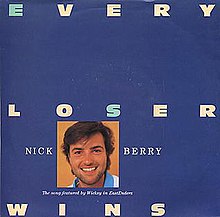
"Peaches" is the second single by the Stranglers, taken from their debut studio album Rattus Norvegicus (1977). Notable for its distinctive bassline, the track peaked at No. 8 in the UK Singles Chart.
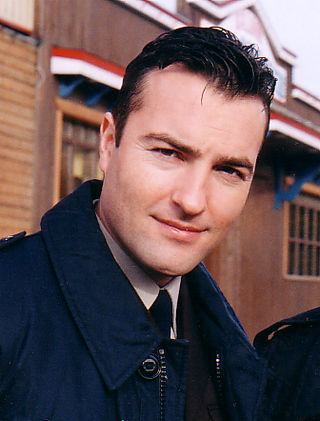
Nicholas Berry is a retired English actor and pop singer. He is best known for his roles as Simon Wicks in EastEnders from 1985 to 1990, and as PC Nick Rowan in Heartbeat from 1992 to 1998. He sang UK chart singles with "Every Loser Wins" in 1986, which went to number one, and the theme song from Heartbeat, a cover of the Buddy Holly song "Heartbeat", in 1992.
Simon May is a British composer. He has composed many British television theme tunes, including EastEnders and Howards' Way, and the music for the 1988 film The Dawning.

"Nobody Does It Better" is a power ballad and the theme song for the James Bond film The Spy Who Loved Me (1977). Composed by Marvin Hamlisch with lyrics by Carole Bayer Sager, the song was produced by Richard Perry and performed by Carly Simon. It was the first Bond theme song to be titled differently from the name of the film since Dr. No (1962), although the phrase "the spy who loved me" is included in the lyrics. The song was released as a single from the film's soundtrack album, and became a major worldwide hit.

Simon "Wicksy" Wicks is a fictional character from the British BBC soap opera EastEnders, played by Nick Berry between 1985 and 1990. Wicksy was introduced to take on some of the more adult storylines that had been scripted for another character, Mark Fowler; Mark's actor, David Scarboro, had left the serial prematurely due to personal problems. Wicksy was the soap's first male pin-up.

"You Can Call Me Al" is a song by American singer-songwriter Paul Simon. It was the lead single from his seventh studio album, Graceland (1986), released on Warner Bros. Records. Written by Simon, its lyrics follow an individual seemingly experiencing a midlife crisis. Its lyrics were partially inspired by Simon's trip to South Africa and experience with its culture. Released in July 1986, "You Can Call Me Al" became one of Simon's biggest solo hits, reaching the top five in seven countries.
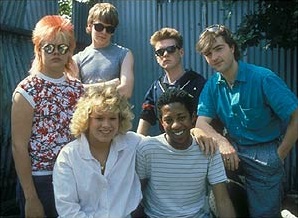
The Banned is a fictional band in the BBC soap opera EastEnders. The storyline first aired in 1986 and although it was considered to be a failure on-screen, it nevertheless became a successful part of the serial's extensive merchandising industry that year, as it spawned two hit singles on the UK Singles Chart.

"You're the Voice" is a song recorded by the British-born Australian singer John Farnham released in 1986, which became an immediate hit in Australia as well as several European countries, his native country the United Kingdom, and Ireland. It was released as a single in September 1986 ahead of his album Whispering Jack, and was written by Andy Qunta, Keith Reid, Maggie Ryder, and Chris Thompson.
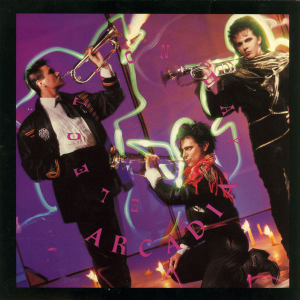
"Election Day" is the first single released by Duran Duran offshoot band, Arcadia.

"Something Outa Nothing" is a song written by Simon May, Stewart James and Bradley James, for the BBC soap opera EastEnders. It featured in an EastEnders storyline in 1986 and was recorded by actors Letitia Dean and Paul J. Medford. It was released as a single in 1986 reaching number 12 in the UK Singles Chart.

"Mockingbird" is a 1963 song written and recorded by Inez and Charlie Foxx, based on the lullaby "Hush, Little Baby".

"More than This" is a song by the English rock band Roxy Music. It was released in March 1982 as the first single from their eighth and final studio album, Avalon (1982). "More than This" was the group's last top-10 UK hit, peaking at No. 6 on the UK Singles Chart, and also charted in the United States, reaching No. 58 on the Billboard Rock Top Tracks chart.
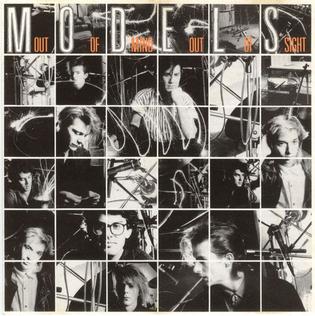
Out of Mind, Out of Sight is the fourth studio album by Australian new wave rock band Models, it was their most successful album and peaked at No. 3 on the Australian albums chart. It was released in September 1985 by Mushroom Records with Nick Launay, Reggie Lucas and Mark Opitz producing.

"So Macho" is a song by American-British singer Sinitta. The song was released in 1985 as her self-titled debut album's second single.

"Black Is Black" is a song by the Spanish rock band Los Bravos, released in 1966 as the group's debut single for Decca Records. Produced by Ivor Raymonde, it reached number two in the UK, number four in the US, and number one in Canada. With the recording's success, Los Bravos became the first Spanish rock band to have an international hit single. A dance remix was released as a single in 1986.
Richard Arnold Pleasance is an Australian rock musician and producer. He was a founding member of Boom Crash Opera on guitar, bass guitar, vocals and as a songwriter in 1985; they released three albums before Pleasance left in 1992. Their hit Australian Recording Industry Association (ARIA) singles, "Great Wall" and "Onion Skin" were co-written by Pleasance, who also co-produced their second album, These Here Are Crazy Times. His debut solo release, Galleon received four nominations at the ARIA Music Awards for 1992. Pleasance composed the theme music for Australian television series, SeaChange (1998–2001), for 2006 feature film Kenny and more recently he composed the theme music for the prison drama series Wentworth. Pleasance is married to Michelle and, as from May 2009, he was living in Hepburn Springs, Victoria where he has a recording studio.

"Out of Mind, Out of Sight" is the title single by Australian new wave rock band Models from their album of the same name. It was released in June 1985 and was their most successful single, which peaked at No. 1 on the Australian Kent Music Report Singles Chart. The album followed in August on Mushroom Records with Nick Launay, Reggie Lucas and Mark Opitz producing and reached No. 3 on the related albums chart.

"Life in a Northern Town" is the debut single by British band The Dream Academy, released in March 1985. It appears on the band's self-titled debut studio album, The Dream Academy. The song was written as an elegy to British folk musician Nick Drake. Written by band members Nick Laird-Clowes and Gilbert Gabriel, the song was produced by Laird-Clowes with help from Pink Floyd guitarist David Gilmour. The single reached No. 7 on the US Billboard Hot 100 chart in February 1986 and reached No. 15 on the UK charts. It is the band's highest charting single in the UK, the US, and Ireland.

"I Can't Wait" is a song by American singer and songwriter Stevie Nicks from her third solo studio album Rock a Little (1985). Written by Nicks, Rick Nowels, and Eric Pressly, the song was released as the album's lead single in Australia, the United Kingdom and Ireland, and as the second single in the United States and Germany.
